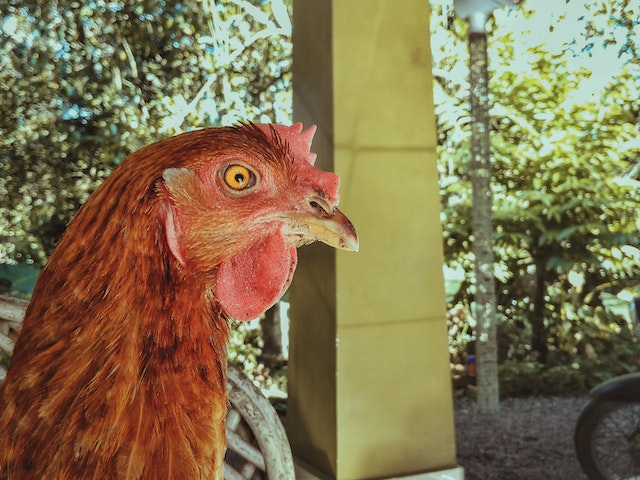
Why does a chicken’s head stay perfectly still when you move its body around? Because chickens cannot move their eyeballs in their eye socket and because they don’t have a vestibulo-ocular reflex.
Our heads (humans) are pretty much constantly moving, yet we can see perfectly well. This is all thanks to the vestibulo-ocular reflex which acts as our own personal Steadicam stabilizer. It is a completely subconscious reflex that allows you to see when you move your head. Without it, your vision would be nothing but blurry and out-of-focus images. Imagine taking a photo with a slow exposure and suddenly turning the camera. That is what your vision would be like without this reflex.
It works because signals from the vestibular system in the inner ear tell your eyes that your head is moving, and they tell your eyes to move in the opposite direction (side to side or up and down). It works with big head movements, and it works with small head movements. The signal is pretty instantaneous and works so quickly because it bypasses the brain. The signal travels up just three neurons and is one of the fastest reactions in the human body. The lag of the eyes behind the head movement is only 10 milliseconds, which is not enough to notice. Thanks to this reflex, we can walk and run without taking our eyes off an object. Very useful if you want to hunt.
You can test the vestibulo-ocular reflex pretty easily. Turn your head to the left and right while you are reading this. Your eyes will stay fixed on the page, and you won’t lose your place. This helped our hunting ancestors. It’s easier to calculate the motion and speed of prey or a predator if your vision is steady. It also helps us on a daily basis because our heads are almost never still.
We have the ability to suppress the vestibulo-ocular reflex, as well. If we are looking at a page and we turn our head, we want the reflex to function, but if we are trying to track a moving object with our eyes and our head at the same time, we want to switch it off. And that is what our brains are able to do.
Birds don’t have this ability because they can’t move their eyes very far. Their eyes are much bigger in relation to their heads than ours are. We can move our eyes through an arc of about 120°but most birds can only turn their eyes through about 20°. To get around this, they turn their heads to look at things. Still, they have a much wider field of vision than we do. The American Woodcock can see 360˚ horizontally and 180˚ vertically. The majority of birds are prey rather than predator and prey animals need to have a wide field of vision.
So, why do their heads stay still when you move their bodies? They need to stabilize their vision when their bodies are moving, just as we do, but the only way they can do it is to fix their heads. Their long necks have a wide range of motion, so they just don’t move their head. We can’t do what they do because our necks aren’t as flexible. The chickens use a very similar compensatory method as we do with our eyes and heads. Signals from the chicken’s visual system are relayed to the neck muscles to turn in the opposite direction as the head in order to keep the head perfectly still.
This is also the reason why chickens and many birds appear to bob their heads while they walk. They are not bobbing so much as they are fixing their gaze on something as they walk. They cannot see while they are in motion, so they take a step, fix their gaze, move their body up to where their head is, and take another step. This looks like bobbing, but it is the only way they can see and move.
So, when you move a chicken’s body around, its head stays perfectly still because it needs to be able to clearly see what it is looking at. And that is what I learned today.
Sources
https://en.wikipedia.org/wiki/Vestibulo%E2%80%93ocular_reflex
https://www.fresheggsdaily.blog/2018/07/why-do-chickens-bob-their-heads-when.html
https://en.wikipedia.org/wiki/Bird_vision
